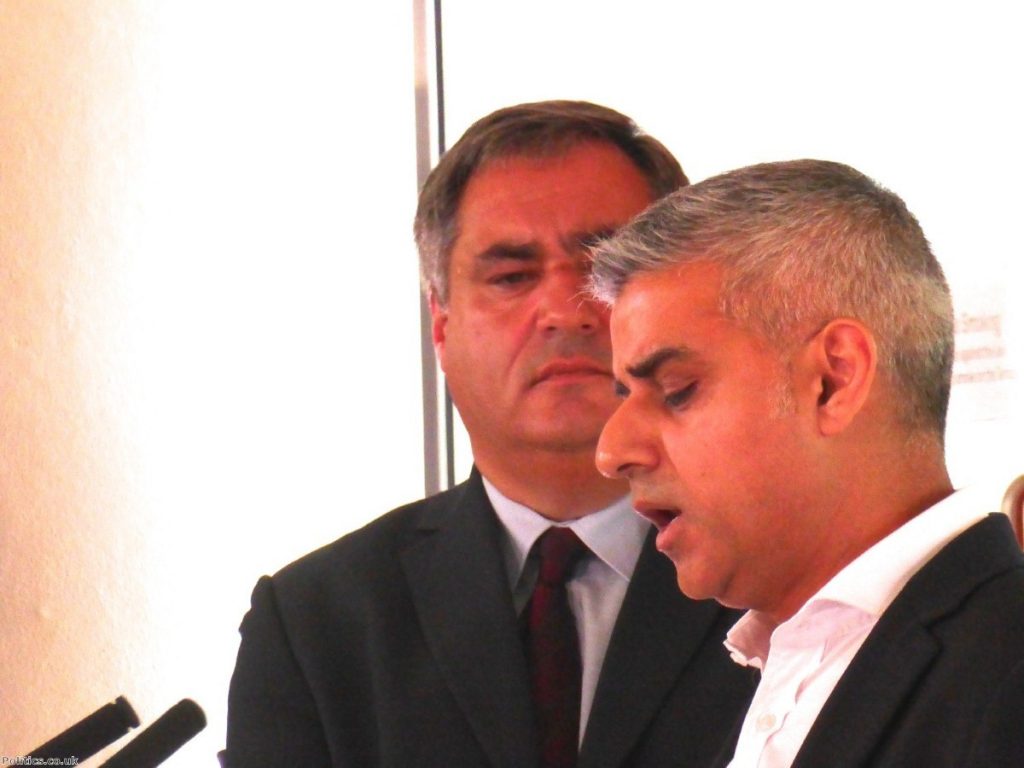Khan he win? Labour harbours doubts about beating Zac Goldsmith
Sadiq Khan may be the narrow favourite with bookies to succeed Boris Johnson as mayor of London, but most Labour people I've spoken to believe he has a mountain to climb in order to beat Zac Goldsmith next year.
As last week's landslide result shows, Khan is popular among party activists. But he also has his enemies. Many of those who backed Tessa Jowell to be Labour's mayoral candidate are now deeply sceptical about Khan's chances in 2016.
"Sadiq can't win," one senior London Labour figure told me this week. "We were beaten in the general election and we're going to be beaten again in London next year."
Others are more hopeful. Despite failing elsewhere, Labour achieved one of its best ever results in London last May, increasing their share of the vote from 37% to 44%. If Khan can hold onto that vote he has every chance of becoming mayor in 2016.
But while this headline figure may look good for Sadiq, it hides a less impressive wider result for the party. Yes Labour's share of the vote went up significantly in London in May, but that increase was mostly concentrated in inner-London seats which Labour already holds. Several of the party's outer London targets failed to go Labour's way, while some of those that did were only won by tiny margins. The kind of swing to Labour in London predicted by the polls simply didn't materialise.
And in many of London's wealthier and less diverse outer suburbs, Tory MPs actually increased their majorities. In Goldsmith's Richmond seat, the Tories increased their majority from just 4000 to over 23,000. Meanwhile, the Tories vote share across London actually went up slightly on 2010. With Corbyn pushing the party further left, outer London votes could be even harder to find than before.

Zac Goldsmith looks a difficult man to beat in London
The current Conservative mayor Boris Johnson won two elections in London, despite his own party then suffering in the polls, precisely by mobilising those votes in outer London. Under Lynton Crosby's management, over a million 'shy Tories' were brought to the ballot box, while the enthusiasm of Labour voters in inner London was suppressed by attacks on Livingstone. This so-called 'donut strategy' was brilliantly effective in two mayoral elections. There's every chance it could be equally as effective for Crosby and Zac Goldsmith in 2016.
Khan's Team understand this and are already moving to counter potential lines of attack against their man.
The first step is to attempt to paint Khan as a 'pro-business' figure. This week he sent out a press release in which he congratulated News Corp – currently enemy number one among many in the Labour party- for their latest business acquisition. Today he tells the Financial Times that he will be "the most business-friendly mayor of all time," and outlines why he is opposed to a number of tax-raising proposals by the new shadow chancellor John McDonnell.

Sadiq Khan plans a 'ceviche offensive' to win over business leaders
Khan says he plans a series of meetings with London business leaders in a Tony Blair-style 'ceviche offensive'. At these meetings he will contrast his own 'pro-business' stance to that of Goldsmith.
"Many in the City have big doubts about Zac Goldsmith's business credentials, because of his opposition to the EU and to the building of any new runways in the South East" a source close to Khan told Politics.co.uk.
It remains to be seen how effective this offensive will be. Given a choice between a charismatic and aristocratic Tory – albeit with an environmentalist streak – and a candidate for a party run by Jeremy Corbyn, will business leaders really back the latter over the former? It also remains to be seen how popular this approach will be with Labour activists. One of the most interesting moments of Labour's mayoral selection came when outsider candidate Christian Wolmar highlighted how Khan, Jowell and Lammy's campaigns had received large donations from property developers. When London is currently living through a housing crisis, could Khan's big business 'cerviche offensive' actually backfire with Corbyn-supporting Labour activists?

Tessa Jowell congratulating Khan on his victory
Ultimately though the London mayoral election will be decided by the public rather than by activists or business executives. In the past four mayoral elections, the candidate whose personality was most liked by the public went on to win. In the last two races that was Boris Johnson. In the current race, Goldsmith with his good looks and easy charm looks a difficult man to beat.
However, next year could be very different. Neither Goldsmith nor Khan are household names and in a more low-key battle, the public's party and policy preferences may end up having more of an effect than they did during the celebrity contests between Boris and Ken. Khan has also proved himself to be a skilful political operator during the mayoral selection. He may yet prove himself to be equally skillful in the wider battle.
Goldsmith is also not without his weaknesses. Last week he appeared to propose a massive expansion of the congestion charge, only to retreat and claim he had been misunderstood. A similar slip-up during an election campaign could be costly. If Khan can exploit Goldsmith's weaknesses, while playing down his own, then there's no reason why he can't win back City Hall for Labour in 2016.





-01.png)